Are gays, lesbians and others in the LGBT community accepted in Mexico?
Brenda de Groot - AvensaTravel
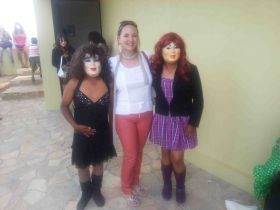 The acceptance of the LGBT community differs from one part of Mexico to another. In Mexico City, the acceptance of LGBT is advanced. They recently had a gay parade at the city center where they also changed the color of the fountain pink.
The acceptance of the LGBT community differs from one part of Mexico to another. In Mexico City, the acceptance of LGBT is advanced. They recently had a gay parade at the city center where they also changed the color of the fountain pink.Here in Oaxaca City, since it is a traditional city, the LGBT community is slowly being accepted. You will see more gay people in the city center but the traditional families still find it difficult to see their daughter or son walking hand in...
 The acceptance of the LGBT community differs from one part of Mexico to another. In Mexico City, the acceptance of LGBT is advanced. They recently had a gay parade at the city center where they also changed the color of the fountain pink.
The acceptance of the LGBT community differs from one part of Mexico to another. In Mexico City, the acceptance of LGBT is advanced. They recently had a gay parade at the city center where they also changed the color of the fountain pink.Here in Oaxaca City, since it is a traditional city, the LGBT community is slowly being accepted. You will see more gay people in the city center but the traditional families still find it difficult to see their daughter or son walking hand in hand with someone of the same sex, but in general, the LGBT community is much more accepted now than before. If you are gay or lesbian, and you move to Oaxaca, you will have a good time living here without any discrimination. But if you come from a Mexican family, your family might still find it difficult to accept.
Posted October 14, 2015
Kristin Wilson - Orbis Relocation
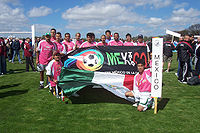 Mexico is pretty open-minded even though it’s Catholic and quite religious in some aspects. I’m not part of the LGBT community, so I don’t have any personal experiences to draw from but from what I see and among my friends, colleagues, the magazines, and the media I don’t see any type prejudice specifically against the gay or lesbian community.
Mexico is pretty open-minded even though it’s Catholic and quite religious in some aspects. I’m not part of the LGBT community, so I don’t have any personal experiences to draw from but from what I see and among my friends, colleagues, the magazines, and the media I don’t see any type prejudice specifically against the gay or lesbian community.I believe that there are even a lot of vacation packages that are LGBT friendly. Especially in Mexico City, in...
 Mexico is pretty open-minded even though it’s Catholic and quite religious in some aspects. I’m not part of the LGBT community, so I don’t have any personal experiences to draw from but from what I see and among my friends, colleagues, the magazines, and the media I don’t see any type prejudice specifically against the gay or lesbian community.
Mexico is pretty open-minded even though it’s Catholic and quite religious in some aspects. I’m not part of the LGBT community, so I don’t have any personal experiences to draw from but from what I see and among my friends, colleagues, the magazines, and the media I don’t see any type prejudice specifically against the gay or lesbian community.I believe that there are even a lot of vacation packages that are LGBT friendly. Especially in Mexico City, in the bigger areas, it’s pretty wide open. They have their own community and they’re doing fine.
Posted October 23, 2015
Alfonso Galindo - I Go Yucatan
Muxe may be vestidas (wearing female clothes) or pintadas (wearing male clothes and make-up). It has been suggested that while the three gender system predates Spanish colonization, the phenomenon of muxe dressing as women is fairly recent, beginning in the 1950s and gaining popularity until nearly all of the younger generation of muxe today are vestidas.
Within contemporary Zapotec culture, reports vary as to their social status. Muxe in village communities may not be disparaged and highly respected, while in larger, more Westernised towns they may face some discrimination, especially from men due to homophobic attitudes introduced by Catholicism and European colonisation. Muxe generally belong to the poorer classes of society. Gender variance and same-sex desire in wealthier communities of the region are more likely to follow a more western taxonomy of gay, bisexual and transgender. Such individuals are also more likely to remain in THE CLOSET Despite this, Muxe have traditionally been considered good luck, worth more than ci sgender women and many now have white-collar jobs or are involved in politics.
In an article published in 1995, anthropologist Beverly china explains that in the Zapotec culture, "the idea of choosing gender or of sexual orientation is as ludicrous as suggesting that one can choose one's skin color."Most people traditionally view their gender as something God has given them (whether man, woman, or muxe), and few muxe desire genital surgery. They generally do not suffer from gender dysphoria because transphobia is a rare attitude in their culture, people are generally accepting of them and they usually have their gender recognised through their clothing, there is not as much pressure to "pass" as in Western societies.
Lynn Stephen writes: "Muxe men are not referred to as “homosexuals” but constitute a separate category based on gender attributes. People perceive them as having the physical bodies of men but different aesthetic, work, and social skills from most men. They may have some attributes of women or combine those of men and women." If they do choose men as sexual partners, neither are those men (known as mayate) necessarily considered homosexual
Posted October 28, 2015
Carmella Peters Romero - Peters & Romero
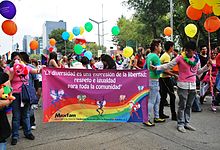 Mexico City is without doubt on the leading edge of advancing LGBT rights! Mexico City is its own state, the Distrito Federal (just like Washington DC), and has been enacting laws to protect and support its LGBT community for many years. Same-sex couples have been able to adopt children and form civil unions in DF for some time - more recently, marriage has become available to same-sex couples as well. Transgender people have been able to legally change...
Mexico City is without doubt on the leading edge of advancing LGBT rights! Mexico City is its own state, the Distrito Federal (just like Washington DC), and has been enacting laws to protect and support its LGBT community for many years. Same-sex couples have been able to adopt children and form civil unions in DF for some time - more recently, marriage has become available to same-sex couples as well. Transgender people have been able to legally change... Mexico City is without doubt on the leading edge of advancing LGBT rights! Mexico City is its own state, the Distrito Federal (just like Washington DC), and has been enacting laws to protect and support its LGBT community for many years. Same-sex couples have been able to adopt children and form civil unions in DF for some time - more recently, marriage has become available to same-sex couples as well. Transgender people have been able to legally change their gender for about 10 years, and recently an amendment to the law made it possible to change gender without requiring medical documentation or psychological evaluation. Additionally, the government of DF (Distrito Federal; Mexico City) runs a number of programs to support LGBT communities and promote awareness. The Zona Rosa neighborhood is perhaps the most famous "gay zone" in the city, and is the hub of the LGBT and LGBT-friendly business and cultural community. The annual Pride Parade is massive and not to be missed!
Mexico City is without doubt on the leading edge of advancing LGBT rights! Mexico City is its own state, the Distrito Federal (just like Washington DC), and has been enacting laws to protect and support its LGBT community for many years. Same-sex couples have been able to adopt children and form civil unions in DF for some time - more recently, marriage has become available to same-sex couples as well. Transgender people have been able to legally change their gender for about 10 years, and recently an amendment to the law made it possible to change gender without requiring medical documentation or psychological evaluation. Additionally, the government of DF (Distrito Federal; Mexico City) runs a number of programs to support LGBT communities and promote awareness. The Zona Rosa neighborhood is perhaps the most famous "gay zone" in the city, and is the hub of the LGBT and LGBT-friendly business and cultural community. The annual Pride Parade is massive and not to be missed! Posted December 9, 2015
Alfonso Galindo - I Go Yucatan
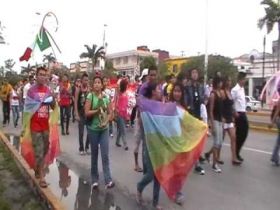 Mexico overall has a gay community. In the Yucatan Peninsula, Merida, Cancun, Playa del Carmen, and Tulum have gay expats as well as locals. They have a vibrant and very open community and acceptance from the locals.
Mexico overall has a gay community. In the Yucatan Peninsula, Merida, Cancun, Playa del Carmen, and Tulum have gay expats as well as locals. They have a vibrant and very open community and acceptance from the locals.  Mexico overall has a gay community. In the Yucatan Peninsula, Merida, Cancun, Playa del Carmen, and Tulum have gay expats as well as locals. They have a vibrant and very open community and acceptance from the locals.
Mexico overall has a gay community. In the Yucatan Peninsula, Merida, Cancun, Playa del Carmen, and Tulum have gay expats as well as locals. They have a vibrant and very open community and acceptance from the locals. Posted December 9, 2015
Gary De Spiegelaere - Celestun Properties
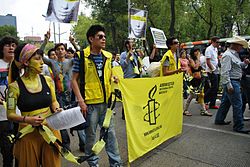 When I first thought of Mexico, my thoughts of it were of a place where macho people live and gays and lesbians wouldn’t be allowed and would be frowned upon. That was my illusion of Mexico before I got here.
When I first thought of Mexico, my thoughts of it were of a place where macho people live and gays and lesbians wouldn’t be allowed and would be frowned upon. That was my illusion of Mexico before I got here.  When I first thought of Mexico, my thoughts of it were of a place where macho people live and gays and lesbians wouldn’t be allowed and would be frowned upon. That was my illusion of Mexico before I got here.
When I first thought of Mexico, my thoughts of it were of a place where macho people live and gays and lesbians wouldn’t be allowed and would be frowned upon. That was my illusion of Mexico before I got here. Posted January 7, 2016
Juan Eufracio Marquez Flores - LM&A Immigration and Legal Services
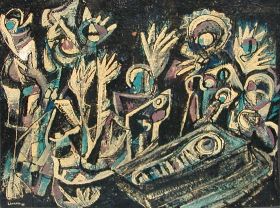 I want to start from local and then we’ll go from there.
I want to start from local and then we’ll go from there.  I want to start from local and then we’ll go from there.
I want to start from local and then we’ll go from there. Posted November 21, 2016
Joan Silver
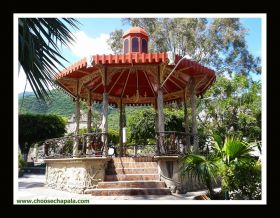 Perhaps there's some persecution of anybody who's different than the norm in certain parts of Mexico. However, in our own community here in Chapala and Ajijic, there are a lot of gays and lesbians who are accepted as part of our group and we're all friends. There haven’t been any issues I've been aware of within the local and expat community in Chapala and Ajijic regarding LGBT group. I see a lot of gay Mexican kids out in the streets who are not judged by their friends...
Perhaps there's some persecution of anybody who's different than the norm in certain parts of Mexico. However, in our own community here in Chapala and Ajijic, there are a lot of gays and lesbians who are accepted as part of our group and we're all friends. There haven’t been any issues I've been aware of within the local and expat community in Chapala and Ajijic regarding LGBT group. I see a lot of gay Mexican kids out in the streets who are not judged by their friends... Perhaps there's some persecution of anybody who's different than the norm in certain parts of Mexico. However, in our own community here in Chapala and Ajijic, there are a lot of gays and lesbians who are accepted as part of our group and we're all friends. There haven’t been any issues I've been aware of within the local and expat community in Chapala and Ajijic regarding LGBT group. I see a lot of gay Mexican kids out in the streets who are not judged by their friends and they all hang out together.
Perhaps there's some persecution of anybody who's different than the norm in certain parts of Mexico. However, in our own community here in Chapala and Ajijic, there are a lot of gays and lesbians who are accepted as part of our group and we're all friends. There haven’t been any issues I've been aware of within the local and expat community in Chapala and Ajijic regarding LGBT group. I see a lot of gay Mexican kids out in the streets who are not judged by their friends and they all hang out together. Posted January 17, 2017
Ron Morgan - Ron Morgan Properties
 The LGBT community in Mexico is very well accepted. Same sex marriage is legal in Mexico, which started in Mexico City first a couple of years ago. Mexico is much more progressive than the US when it comes to LGBT acceptance. As far as I can see, we have so few issues that it's almost to the point of being overlooked as not an issue.
The LGBT community in Mexico is very well accepted. Same sex marriage is legal in Mexico, which started in Mexico City first a couple of years ago. Mexico is much more progressive than the US when it comes to LGBT acceptance. As far as I can see, we have so few issues that it's almost to the point of being overlooked as not an issue.  The LGBT community in Mexico is very well accepted. Same sex marriage is legal in Mexico, which started in Mexico City first a couple of years ago. Mexico is much more progressive than the US when it comes to LGBT acceptance. As far as I can see, we have so few issues that it's almost to the point of being overlooked as not an issue.
The LGBT community in Mexico is very well accepted. Same sex marriage is legal in Mexico, which started in Mexico City first a couple of years ago. Mexico is much more progressive than the US when it comes to LGBT acceptance. As far as I can see, we have so few issues that it's almost to the point of being overlooked as not an issue. Posted June 25, 2017
Tom Leonard - Hotel Perico
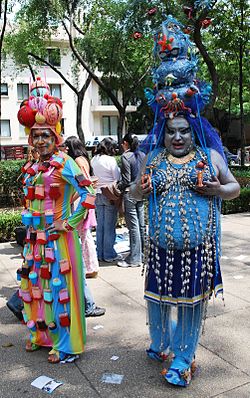 I haven't noticed any problem with LGBT acceptance in Mexico. There are areas in Guadalajara and bigger areas in Puerto Vallarta where they have higher concentrations of LGBT residents. For example, the Romantic Zone in Puerto Vallarta has a lot of gay bars and LGBT acceptance is not a problem with the community and the city.
I haven't noticed any problem with LGBT acceptance in Mexico. There are areas in Guadalajara and bigger areas in Puerto Vallarta where they have higher concentrations of LGBT residents. For example, the Romantic Zone in Puerto Vallarta has a lot of gay bars and LGBT acceptance is not a problem with the community and the city.  I haven't noticed any problem with LGBT acceptance in Mexico. There are areas in Guadalajara and bigger areas in Puerto Vallarta where they have higher concentrations of LGBT residents. For example, the Romantic Zone in Puerto Vallarta has a lot of gay bars and LGBT acceptance is not a problem with the community and the city.
I haven't noticed any problem with LGBT acceptance in Mexico. There are areas in Guadalajara and bigger areas in Puerto Vallarta where they have higher concentrations of LGBT residents. For example, the Romantic Zone in Puerto Vallarta has a lot of gay bars and LGBT acceptance is not a problem with the community and the city. Posted August 8, 2017



.png)